The Builders
The Greatest (Sacrifice) Generation
The Builders

The Pioneers

The Globalists

The Wallflowers


**Chart is fitted to accentuate relative ideological leanings of each generation.

1949-1961
The Builders
The Greatest (Sacrifice) Generation
Size: 188 million (13.3% of China’s population)
Essential traits:
Equalizers
Harmonizers
Worriers
Overview
The closest analog to America’s Greatest Generation, the Builders are the backbone of modern China. They quite literally built the country, through blood, sweat, and tears. Before skyscrapers and bullet trains, the Builders were melting pots and pans in backyard furnaces to fuel China’s fledgling steel factories and skipping college to labor in the countryside.
Like the Americans whose lives were upended by the Great Depression and World War II, the Builders experienced repeated disruptions during their formative years. Their best years were punctuated by turmoil, and they didn’t fare much better during adulthood. Millions of mid-career professionals lost public sector jobs (下岗) as China reformed its state sector in the 1990s.
For all their sacrifice, political elites of this generation have the sense that they deserve to run China. Their views, particularly toward inequality and security, are shaped in part by their generation’s perennial feeling of abandonment by a modern China that has embraced capitalism and globalism.
As this generation now dominates Chinese politics, political leadership has doubled down on stability, equality, and “common prosperity” as foundational features of its policy platform. This generational cohort tends to oppose unfettered capitalism and favors support for the state sector.
Key Events
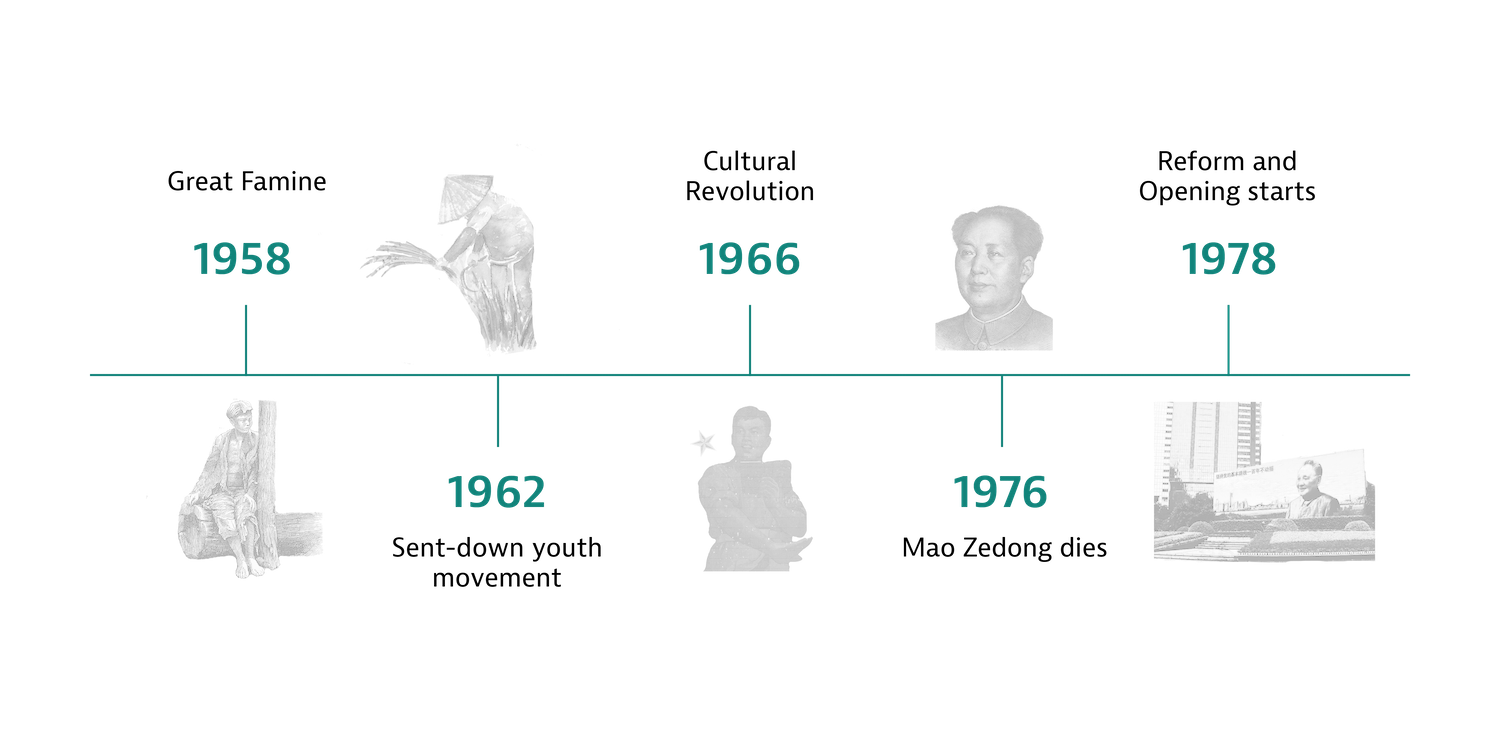
Essential Traits
Equalizers
A common refrain from the Builders is that although they had it rough, at least everyone was in it together. From that vantage point, they have a tendency to view Chinese society today as unfair and unequal because their hard-scrabbled and disciplined life did not get them ahead, even as younger generations have prospered.
It’s a sentiment captured in what has become a “memeified” quote on Chinese social media: “How come the Jack Mas of the world earn more in a day than we do in a lifetime?” It is a gripe that may sound familiar to anyone following the populist undercurrent in American politics.
This is a generation that is more likely to look approvingly at the recent crackdown against big tech. Not only is it difficult for the Builders to comprehend how tech entrepreneurs acquired vast fortunes in such a short time, they tend to be wary of anyone who appears “too big for their britches.”
In short, the Builders want to double down on the “common” part of common prosperity to equalize a society that has short-changed them. That idea of equality is usually centered on redistribution and stripping the exclusive privileges that the wealthy have on healthcare and education access, as well as private land ownership.
Harmonizers
The Builders may romanticize about the halcyon days of being equally poor, but they’ve also long lost their revolutionary zeal. They want more equality in society, but not at the cost of overturning the status quo. They oppose the excesses of capitalism but are just as critical of extreme leftist politics that ruined their teenage years during the Cultural Revolution.
This may make them seem like “centrists,” but it’s more that they opt for stability and security after a lifetime of lurching from extreme to extreme. Perhaps unsurprisingly, balance and harmony are key for The Builders, making their worldview relatively conservative with a small “c.”
For instance, this is the generation that would have ardently championed then-President Hu Jintao’s “Harmonious Society” agenda in the early-2000s as a long overdue course correction towards embracing the social equality ideals of the Mao era.
Worriers
Stability was a scarce commodity in the Builders’ lives—they took their lumps time and time again as China went through the growing pains of transforming an impoverished, agrarian economy into the world’s leading industrial power. That’s why Xi Jinping’s “stability” mantra rings true to so many Builders. For once in their lives, they want to be able to count on society coming through for them, rather than the other way around.
But when the Builders look at today’s China, they see a country that has seemingly abandoned them. This anxiety-ridden outlook isn’t just the byproduct of misplaced PTSD from their Sent- Down experiences—the Builders have legitimate reasons to worry that society will once again run rough-shod over them in retirement.
Weak social safety nets, combined with a demographic that’s increasingly unbalanced as a result of the One-Child Policy, mean that the Builders see themselves aging into an era of less protection and thinner cushions. With pension funds running low and China already raising retirement age requirements, the Builders might have to sacrifice again for the greater good—one last time.
It’s a tough lot to stomach, but worry and uncertainty aren’t new for a generation wizened by hardship. In fact, the latest worry for the Builders is China’s youngest generation, the Wallflowers. As grandparents might, the Builders often bemoan, and may even resent, the inability of the Wallflowers to “eat bitterness” (吃苦) and their tendency to chase fads. What will happen to the nation they sacrificed so much to build in the hands of their “lying flat” successors?
Representative Members



Xi Jinping
The current General Secretary of the Chinese Communist Party (CCP), Xi Jinping has been at China’s political helm since 2012.
The son of a prominent CCP revolutionary, Xi labored in rural Shaanxi Province during his teenage years as a Sent-Down Youth after his father’s purge during the Cultural Revolution. Xi experienced firsthand how erratic and uncontrolled politics could wreak havoc on Chinese society during his youth.
That’s why as China’s top leader, he has prioritized stability and common prosperity over growth, frequently invoking experiences during his formative years in speeches on national priorities.
Wang Jianlin
The founder of real estate giant Dalian Wanda Group, Wang Jianlin is among the richest men in China.
The son of a Long March veteran, Wang enlisted in the People’s Liberation Army (PLA) at age 15, where he served for 17 years and achieved the rank of Commander. Wang parlayed his PLA connections into a property development role in the 1980s, marking the beginning of his ascent to real estate tycoon.
Part of China’s first generation of billionaires, Wang has suggested that government and businesses should develop close relationships and has emphasized the importance of market stability for investors.
His investments have been consistent with that mentality. After the onset of the US-China trade war in 2018, Wang sold off most of his overseas assets—including those in Chicago—instead funneling money into domestic projects.
Zhang Yimou
Filmmaker Zhang Yimou was born to a former officer in Chiang Kai-shek’s Nationalist forces, making him the subject of persecution during his youth.
Similar to Xi, Zhang spent a full decade as a Sent-Down Youth in Shaanxi province, working as a farm laborer and operating a cotton mill.
He attended the Beijing Film Academy in 1978 when it reopened after the Cultural Revolution and went on to direct some of China’s most prominent films of the late 20th and early 21st century.
Many of Zhang’s classic works ran into censorship issues, including To Live, which famously dealt with the trauma Chinese people endured during the Great Leap Forward and Cultural Revolution.
In recent years, Zhang has taken on the role of China’s national storyteller, directing the opening ceremonies of both the 2008 and 2022 Beijing Olympics.

1962-1978
The Pioneers
The Wild, Wild West Generation
Size: 373 million (26.4% of China's population)
Essential traits:
Opportunists
Workaholics
Rebels
Overview
As the largest single generation in China, the Pioneers were the architects and drivers of one of the most astonishing economic transformations the world has ever seen. They were shaped by a prolonged period of creative destruction in which the shackles of communism were thrown off, replaced by exactly what no one was quite sure, not even Deng Xiaoping himself.
But capitalism was copacetic and optimism was in the air because China was finally on the move, and the Pioneers moved with it. Their generation is populated by the “misfits and rebels” to whom Steve Jobs famously paid homage—experimentation and risk-taking defined the generation’s ethos.
Little surprise, then, that many of today’s tech titans and private sector CEOs hail from this generation. They weren’t necessarily highly educated, but were forged from the melding of opportunism, intense work ethic, hard hustle, and a “take no prisoners” attitude. Far from coasting to the top, this generation will be the first to tell you that their success was earned, not given.
For all their achievements, however, the Pioneers had their fair share of setbacks. State sector reforms of the 1990s also hit this generation and left many jobless. But unlike the Builders, the Pioneers were still relatively young at the time and could more easily adapt and adjust their career paths.
As the generation that grew up during China’s transition from a planned to market economy, the Pioneers tend to have a more nuanced orientation than one might expect. They are generally pro-market pricing and foreign capital but also value strong social safety nets and support robust government subsidies. Their political attitudes, too, reflect both support for strong, rules-based governance and a healthy skepticism of explicitly Western institutions.
Key Events
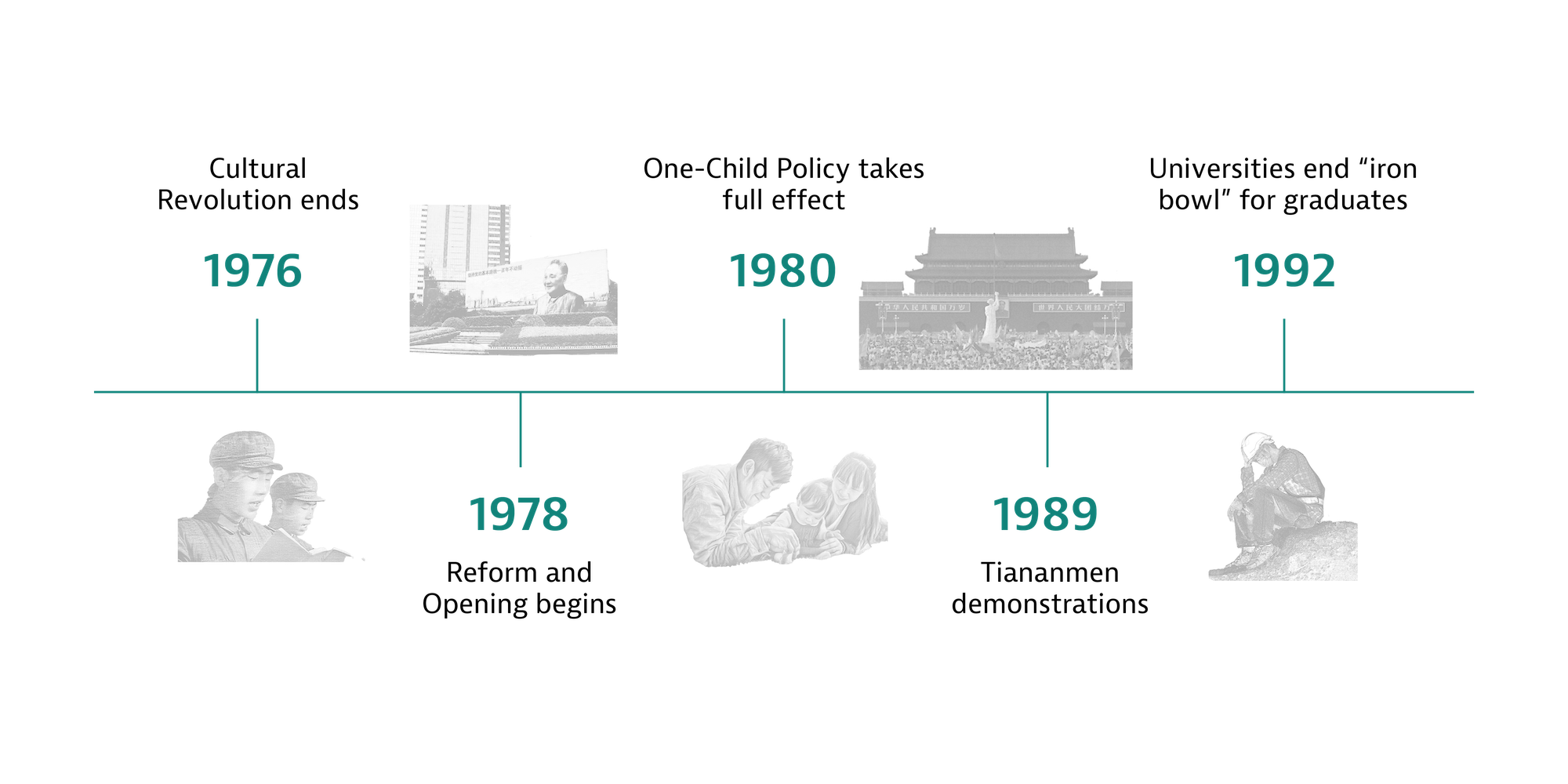
Essential Traits
Opportunists
If the Builders are akin to America’s Greatest Generation, the Pioneers resemble America’s Gilded Age generation, linked by a common thread: opportunity.
The latter capitalized on opportunities emerging from the Second Industrial Revolution, creating some of the wealthiest individuals in history in the process (think Rockefeller, Vanderbilt, and Carnegie). The former rode the opportunity train that was “Reform and Opening Up,” which gave rise to an unregulated private sector and unprecedented experimentation and innovation.
The Pioneers were thrust into uncharted territory. What was impossible just a few years before gave way to a world of seemingly limitless potential, and anyone with drive and ambition could make something of it. And make something they did—the Pioneers cultivated a private sector that had been nonexistent, creating a legion of successful companies and new institutions along the way.
Even the phasing out of guaranteed public sector jobs for college graduates didn’t faze the Pioneers much. They saw it as a sink or swim moment—a once-in-a-lifetime opportunity to determine their own futures.
Workaholics
To get rich may be glorious, but the path to riches isn’t paved with glory. It requires hustle, drive, and a “pick yourself up by the bootstraps” mentality, which the Pioneers had in spades. That is not to say the Builders didn’t work hard, too. The difference is the Builders’ hard work had little impact on individual outcomes.
Not so for the Pioneers. For this generation, an extraordinary work ethic often led to financial rewards, big and small. So everyone put their nose to the grindstone, from migrant workers on the assembly line in Dongguan to young entrepreneurs raising seed funding for their tech startups.
Not everyone reached the pinnacle of success, but that wasn’t for the lack of effort. Indeed, it was the Pioneers who inculcated China’s “996” work culture of 9:00am to 9:00pm, six days a week. Although 996 has lost its luster, this hard grind mentality is hardly controversial among a generation that lived through an era where six-day work weeks were the norm.
In fact, prominent Pioneers have vehemently defended the spirit, if not the letter, of 996. Alibaba’s Jack Ma has said workers should consider 996 “a huge blessing” and the path to “achieving [success],” while JD.com founder Richard Liu has quipped that 996 opponents are “slackers.”
Rebels
At their core, the Pioneers are rebels—not in the militaristic sense but in terms of their willingness to contest the status quo. The Pioneers didn’t just create new businesses and products, but challenged the foundation upon which Maoist China was built.
It helped that they had a leader in Deng who gave the Pioneers ample runway to break down the old and usher in the new. One of Deng’s favorite sayings was “if you open the window for fresh air, you have to expect some flies to blow in,” tacitly acknowledging that tolerance for antagonism towards existing institutions was necessary for progress.
The Pioneers’ boundary-bending ways did not always end well. Pushing the envelope in the 1989 Tiananmen demonstrations led to drastic and demonstrable costs. But even the crackdown didn’t entirely stifle that rebellious streak in the Pioneers, who went on to disrupt industries and create fortunes.
It’s the first generation in modern China to have created its own wealth. Even though they may be more chastened today, the Pioneers, surrounded on either side by more conformist generations, remain China’s only true iconoclastic and irreverent generation.
Representative Members
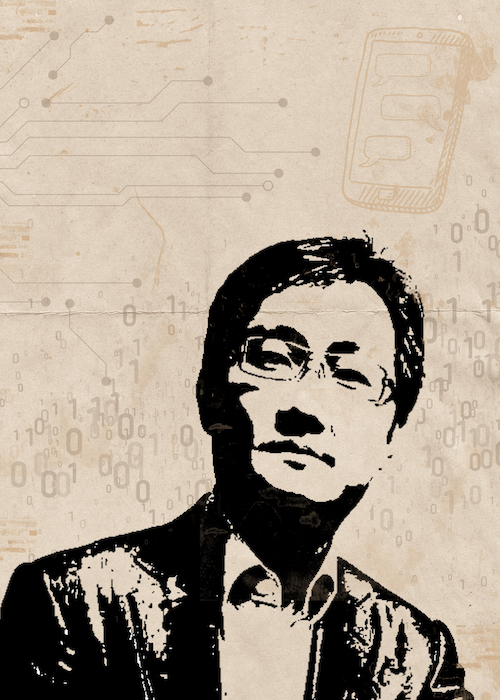

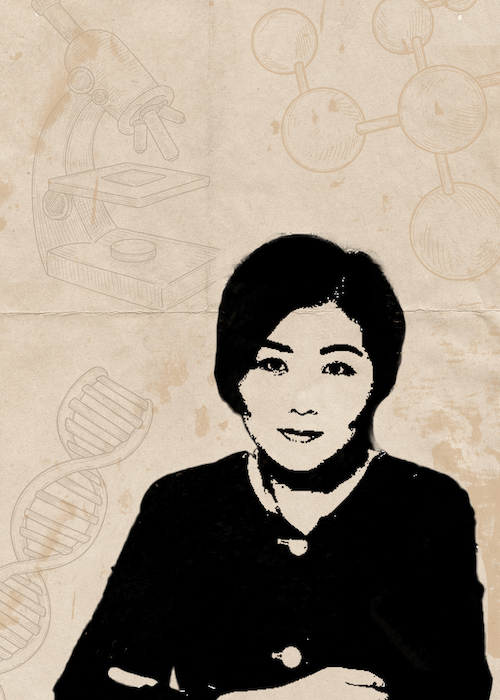
Pony Ma
As part of the “Ma tech duopoly” in China, Pony Ma currently ranks as the fourth richest man in China.
Ma is essentially a native of Shenzhen, growing up in the rapidly developing coastal city where his father worked as a port manager. He graduated from Shenzhen University in 1993 with a computer science degree and was part of the first wave of Chinese graduates to take the plunge into the private sector, founding Tencent in 1998.
Ma is a product and engineer guy at heart, known for his pragmatic nature and reserved personality. He has built one of the world’s largest tech companies in part by carefully toeing the line between the private and public sectors.
He has been described by colleagues as living by the Jiang Zemin-era mantra that “keeping quiet will help you make a fortune.” “Tencent is just an ordinary company benefiting from the country’s development,” Ma said after Tencent came under regulatory fire in China’s recent tech crackdown. “It can be replaced at any time.”
Liu Cixin
As prolific as he is imaginative, Liu Cixin is often credited with reviving the sci-fi genre in China.
His most notable work, The Three-Body Problem, became the first Asian novel to win the prestigious Hugo Award for best sci-fi in 2015. It was touted by former President Barack Obama as one of his favorite sci-fi books and is currently being adapted into a Netflix show.
A child of the Cultural Revolution, Liu was sent to live with his grandparents in rural Henan to avoid the tumult. Although an engineer by training, Liu was heavily influenced by the Western sci-fi canon—everything from Verne’s Journey to the Center of the Earth to Orwell’s 1984 and Bradbury’s 2001: A Space Odyssey.
Like all good sci-fi, Liu’s work doesn’t shy away from weighty political and social issues, with some novels drawing inspiration from his generation’s seminal experiences, including the Cultural Revolution and Tiananmen protests.
Despite it all, Liu considers his generation lucky, saying “the changes [we] had seen were so huge that [we] now inhabit a world entirely different from that of [our] childhood.”
Yan Ning
Born just a year after Mao’s death, molecular biologist Yan Ning skyrocketed to the top of her field by age 30, becoming the youngest professor and doctorate advisor in Tsinghua University history in 2007.
A Princeton PhD, Yan was one of nearly 60,000 Chinese to study in America in 2000. Although she conducted a decade of groundbreaking research at Tsinghua, Yan controversially accepted a tenured professorship at Princeton in 2017, a move criticized by many Chinese as a betrayal of her country.
Yan responded as a Pioneer would, saying she didn’t want to constrain her academic potential by limiting herself to a single institution. She truly didn’t. After five years at Princeton, she returned to China and established a new medical academy in Shenzhen.

1979-1991
The Globalists
The Beneficiaries Generation
Size: 280 million (19.8% of China's population)
Essential traits:
Materialists
Embracers
Pragmatists
Overview
Whereas the Pioneers spent their formative years riding the vagaries and excitement of reforms that required “crossing the river by feeling for stones,” the Globalists came of age when reform was largely complete and China’s economic opening was in full swing. During the 18-year period after the youngest Globalists were born, China’s economy grew at an 11% annual clip.
The Globalists have little conception of a China without major Western brands and media. This generation’s youngest members were just eight years old when China’s first KFC opened in 1987, at the same time as major Hollywood studios entered the Chinese market.
Acceptance of globalization is the default for this generation, which likely went a long way towards shaping the Globalists’ generally idyllic view of the West. Not only did that motivate them to study in Europe and America, it also made them more likely to support free speech provisions, individual freedoms, and market privatization. In short, this is the generation most comfortable with Western values of all four generations.
But the Globalists’ pro-market, individualistic bent has something of a wrinkle. They are more inclined to play by the books than the rebellious Pioneers. As the first generation to significantly benefit from China’s difficult transition to global economic power, the Globalists are more concerned with “looking out for number one” than trying to shake up the status quo to align with their worldview.
So while many Globalists support Western values on an individual, and perhaps abstract, level, they are also generally fine tolerating features of a system they may not agree with.
Key Events
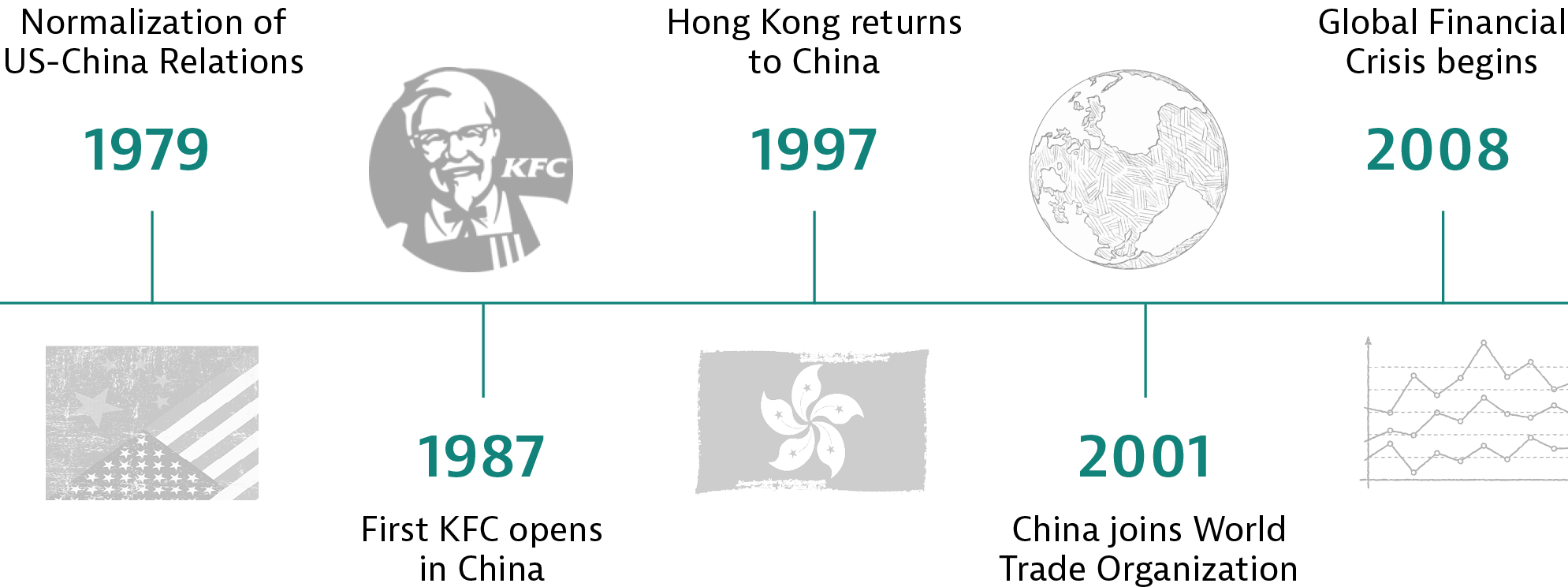
Essential Traits
Materialists
As China’s market matured, the Globalists were supposed to be the “domestic consumption engine” over which global companies salivated. By the time they reached adulthood in the 2000s, the Globalists had unprecedented access to goods and services from anywhere in the world.
This generation is defined more by what they consumed and the brands they wore than the companies they built. Indeed, the Globalists are consumers at heart, combining with the Wallflowers generation to account for over 70% of domestic consumption in 2021.
Moreover, as the first true “one-child” generation, the Globalists had attention lavished upon them from their parents to support their consumption—from education to housing. With singular resources at their disposal, it’s no surprise the Globalists have continued to embrace the “买买买” (“buy, buy, buy”) mindset into adulthood.
This is the generation whose spending turned Singles’ Day into the largest single-day shopping spree in the world, topping out at over $140 billion in sales in 2021. The Globalists are also the ones most likely to be preoccupied with luxury brands, a practical impossibility for the Builders.
Embracers
The Globalists integrated with the outside world like no other generation. It might be most obvious in their propensity for American fast-food chains and European luxury brands, but their acceptance of the global community runs much deeper than simply buying Gucci bags.
Take education. Just 40,000 Chinese were studying abroad when the oldest Globalists turned 21. That number grew exponentially over the next decade and broke 700,000 in 2019. The Globalists didn’t just study abroad, they also stayed abroad: in 2001, only 14% of Chinese studying abroad returned to China.
That flow of people had much to do with the stable environment that anchored global affairs: namely four decades of US-China détente. The oldest members of this generation were born in the year of normalization between the two countries, which shaped their views of the West and made the United States in particular a coveted destination.
So this generation gleefully greeted China’s WTO entry in 2001, optimistic about cooperation with the West and believing China could become a global power without ruffling any feathers. But it wasn’t just about trade—it was a period where Globalist-led Chinese companies were aiming to expand beyond the domestic market.
It is perhaps no coincidence that the first Chinese tech company to truly thrive in Western markets was not Pioneer-founded Tencent or Alibaba but ByteDance, whose Globalist founder made TikTok an international sensation.
Pragmatists
With their global mindset and relative support for Western-style political norms, it might seem counterintuitive that the Globalists don’t manifest as political activists very often. Both the Builders (1976) and Pioneers (1989) had generation-defining protests. The Globalists, in contrast, have been relatively meek.
That’s because the Globalists’ individualistic streak is leavened by an equally powerful desire to avoid upsetting the status quo. As major beneficiaries of the existing system that the Builders and Pioneers built, it would be counter to their self-interest to undermine the very system that’s allowed them to prosper.
If personal success and achievements can be had without rocking the boat, the pragmatic Globalists may wonder why one would bother. This mindset could be a result of the Globalists’ upbringing as only children, where their protective parents who bore witness to an era fraught with social and political instability wanted them to avoid similar outcomes and instead focus on their careers.
This is not to say Globalists don’t hold strong views, and likely wish China could engage in further political reforms. But the Globalists seem less interested in outright activism, preferring to focus on their personal business at hand. Even as Globalists will readily admit China’s flaws, they tend to be clear-headed about working within the system to achieve gradual change.
Representative Members
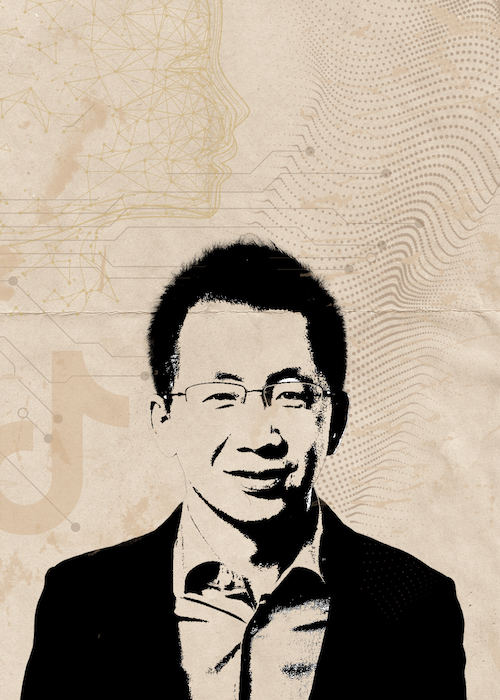


Zhang Yiming
Born to civil servants in Fujian province, Zhang Yiming got his start at Nankai University, where he majored in software engineering.
On either side of a stint at Microsoft, Zhang worked at a handful of startups before founding ByteDance in 2012, a platform and social media company that produced one of China’s most prominent tech exports and a truly global product: TikTok.
Zhang, unlike a Pony Ma, made ByteDance’s global expansion a priority from the outset, believing that competing in the global market was a necessity for technological innovation.
Such global aspirations have caused problems for Zhang domestically, however. In 2018, he issued a public apology for “failing to realize technology must be guided by core socialist values” after his attitude towards content moderation came under official reproach.
Li Yuchun
Born in Chengdu to a working-class family, Li Yuchun rose to stardom in 2005 as the winner of American Idol-style singing competition “Super Girl”.
The first Chinese show to allow its 400 million viewers to democratically vote for contestants, Super Girl turned Li, who went by the stage name Chris Lee, into a real superstar overnight.
With short, spiky hair and androgynous in appearance, she defied stereotypes of Chinese female pop singers. In fact, it was precisely Li’s individuality that resonated with viewers and drove the groundswell of grassroots support for her.
Her embrace of individuality, even more so than gracing the cover of Time magazine or signing with major global brands, makes Li a true Globalist. She knows it, too, telling NPR that individuality defines her generation: “We’re a generation of only children. Most of us have no brothers or sisters. So our individuality is very evident.”
Li Na
Some might say international tennis star Li Na was destined to be a racket sports icon—her father was a professional badminton player himself.
In reality, her success was the product of hard work and global access to top trainers. Although Li joined China’s National Tennis Team at 15, she was sponsored by Nike to train in Texas a year later.
After years of clashing with the national team leadership, Li chose to leave the state-run sports system in 2008 after reform policies enabled her to hire her own coaching staff, fund her own tour expenses, and keep most of her tournament earnings.
The move proved a boon for her career—she became a two-time Grand Slam champion and achieved a career-high WTA ranking of No. 2. At her peak, Li was one of only three female athletes in the world to rank on Forbes’ Top 100 earnings list.
Li’s on-court success, independent streak, and wry humor won her legions of fans and admirers alike. As a role model, she has inspired an entire generation of female tennis players, including British rising star Emma Raducanu.

1992-2004
The Wallflowers
The Walking Contradictions Generation
Size: 208 million (14.7% of China's population)
Essential traits:
Glocalists
Sinophiles
Assimilators
Overview
The Wallflowers are in many ways the opposite of the Pioneers. The latter generation produced a Pony Ma, while the Wallflowers are largely populated by those who want to work for him rather than become him.
It’s a generation that has a stronger preference for a paternalist state and opts for security over unnecessary risk-taking. Rather than feeling for the rocks to cross the river, the Wallflowers prefer having two feet solidly planted on the pavement, even if that means working for state-owned enterprises with lower salaries and limited career prospects.
This is also a generation of striking contradictions. Its members, especially the younger ones, are at once globalist and nativist, simultaneously pro-market and pro-state, and champion the free flow of goods but are skeptical of the free flow of ideas. For instance, the Wallflowers support content control more than any previous generation.
Key Events
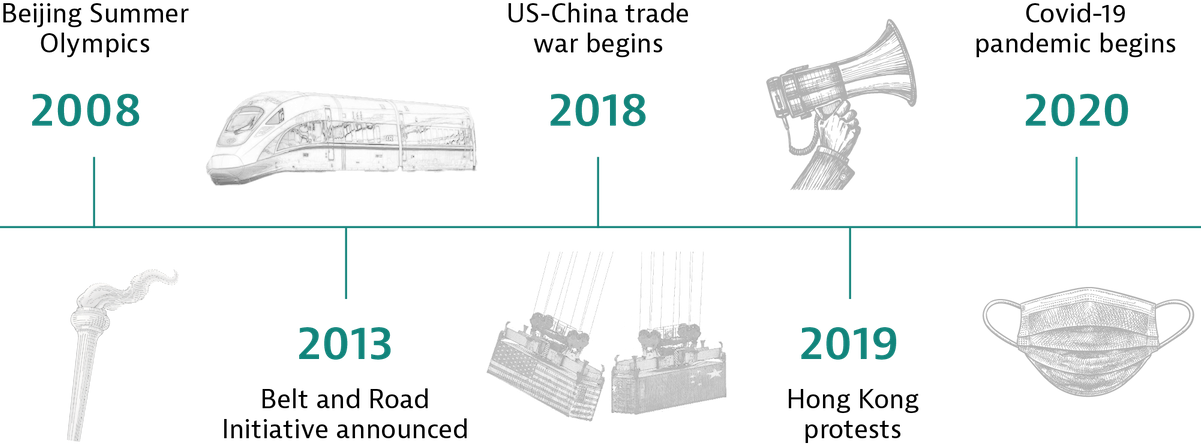
Essential Traits
Glocalists
The Wallflowers are digital natives, having known nothing else other than a world in which information technology and free trade have stitched together the global economy. In fact, they are even more pro-market in orientation than the Globalists but share similar, paternalistic political leanings with the Builders.
While it also accepts globalization as the default reality, this generation is selective about its embrace of globalism. It is less enamored with foreign products and culture, viewing “Made in China” with more pride and adoration. It is not so much that the Wallflowers spurn foreign products, they are simply less envious of them relative to previous generations.
They don’t desire any regression from China’s global integration, but they increasingly want to see China offering its own versions of products, culture, and ideas to the global commons. They want to see “Chineseness” indigenized into those products and brands, which means that localization of foreign brands will be crucial to tap the consumption potential of this generation.
This localization can already be seen on the menus of Chinese KFCs that include fried dough and sticky rice noodles. KFC isn’t the only one—Starbucks has changed its entire beverage design to incorporate Chinese cultural elements and compete in the fast-growing tea market currently dominated by Chinese domestic brands like Hey Tea.
Sinophiles
The tendency to attribute this nativist attitude among China’s youngest generation to the success of patriotic education that began in the 1990s is understandable. But to cast the Wallflowers as “brainwashed knee-jerk nationalists” is overly simplistic.
While there’s no denying the education system had an impact on the Wallflowers’ ideology, their patriotism is more pro-China than it is specifically anti-foreign. That distinction is important.
These young “Sinophiles” have more access to and experience in the world beyond China than any previous generation. Their parents still want them to get an education in Western countries, with some of them starting as early as high school.
But that deep and regular interaction with the West has not been an unalloyed good in terms of shaping perceptions and views. For one, the longer time they’ve spent in the United States or other countries, the more they recognize the deficiencies and warts of foreign systems.
These experiences have “normalized” America not as some idyllic paradise that previous generations had thought, but just a large and messy country with a litany of its own problems. They have a better sense of the “balance sheet” of American strengths and weaknesses, particularly in contrast to their own country.
As the tangible quality of life aspects become more equalized between top tier cities in China and America, the contrast naturally becomes focused on the intangibles of values, culture, and the general environment in which you want to live your life.
The Wallflower generation is the most cognizant of the imperfections of Western countries, even as they acknowledge the shortcomings of China itself. But given the choice between living in two imperfect countries, it is only natural to opt for the more familiar.
Assimilators
Part of what determines the Wallflowers’ choice set is the fact that they tend to be more risk averse. The audacity and irreverence of the Pioneer generation is replaced by a general timidity in the face of insecurity.
The Wallflowers aren’t particularly fond of rocking the boat, nor are they interested in grinding it out like entrepreneurs of previous generations. Not to say there aren’t intrepid entrepreneurs among this generation, but the Wallflower-led “lying flat” movement underscores their stark contrast with the gung-ho, 996 mentality of the Pioneers.
This may be why Xi Jinping has publicly chided this generation, warning that today’s youth need to experience hardship and avoid lying down. Despite Xi’s laments, however, the Wallflowers seem to be standing behind him more than previous generations.
A vocal minority of this generation, called 小粉红 (literally “little pinks”), has regularly praised the government’s heavy-handed approach to handling Covid-19 and eagerly defended Beijing’s response to domestic and international crises.
But it’s not simply this small contingent. There is a sizable “pro-China” element among the Wallflowers generation, which further reinforces that it is a walking contradiction. On the one hand, this generation’s college graduates faced a brutal 26.3% unemployment rate in 2020. On the other, they still would rather return home from abroad in search of cushy public sector jobs.
In short, there seems to be an increasing disconnect between the Wallflowers’ anxiety over their own individual station in Chinese society and their impassioned defense of China as a powerful nation. Whether that contradiction gets resolved as the youngest members mature into their careers and adulthood, realizing the wall has fallen around them, remains to be seen.
Representative Members
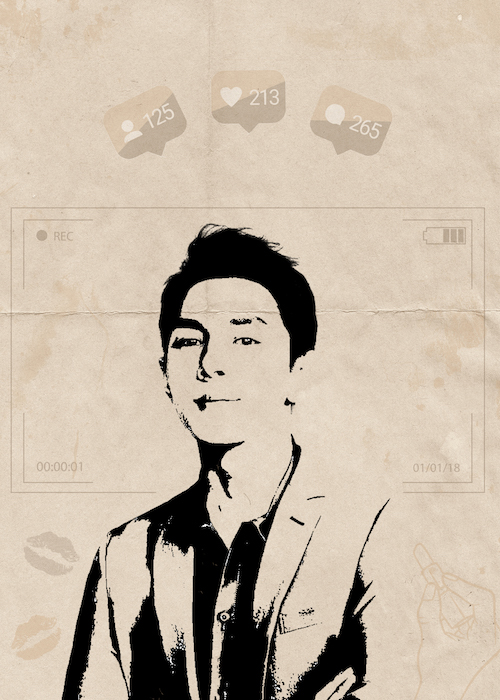

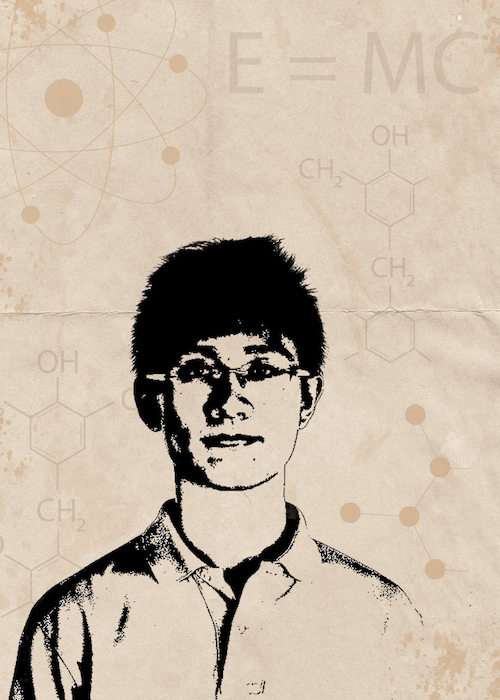
Li Jiaqi
Branded the “Lipstick King,” Li Jiaqi is one of China’s most prominent Key Opinion Leaders (KOLs)—social media “influencers” who tend to make a living primarily by converting enormous followers to consumers.
Just a few years ago, Li was working as a L’Oreal beauty advisor and earning less than $500 a month. Today, he is among China’s most recognizable faces, hosting Taobao Live sessions that attract tens of millions of nightly viewers and pulling in record sales of up to $2 billion per day.
Known for his trademark “oh my god” and “buy it” catchphrases and propensity to try out beauty products live, Li has become something of an icon of the Wallflower generation. Many are seeking to imitate his success by becoming influencers instead of holding down traditional jobs. Li and others have used their platforms to encourage consumers to “buy Chinese” and support local brands.
Guan Xiaotong
Third-generation actress Guan Xiaotong has been on the Chinese film circuit since she starred in Nuan at four years old. Now, she’s one of China’s most promising young actresses, having appeared in nearly 100 films and television shows by age 18.
While not particularly vocal on the political front, Guan has served as Chinese ambassador to the United Nations Environment Program’s “World Life Day” campaign and joined Party-organized video campaigns supporting the “Chinese Dream.”
She’s also a brand ambassador for many prominent global companies but has sided with Chinese interests when confronted with controversy. For instance, Guan recently ended her partnership with Coach after the brand sold clothing that listed Hong Kong and Taiwan as independent countries.
Cao Yuan
Born in Chengdu, Cao Yuan is currently a postdoc researcher in the Jarillo-Herrero lab at MIT. His breakthrough graphene research in 2019 has received widespread acclaim in the scientific community.
Despite his success in America, Cao publicly turned down a US green card offer, historically highly sought after by Chinese nationals working in the United States. When asked why he would turn down such an opportunity, Cao retorted, “What is an American green card? I am Chinese and I want to go back to China.”
Cao represents a new generation of Chinese scientists who, while still holding American education in high esteem, are increasingly willing to make their careers in China rather than roughing it in America.

